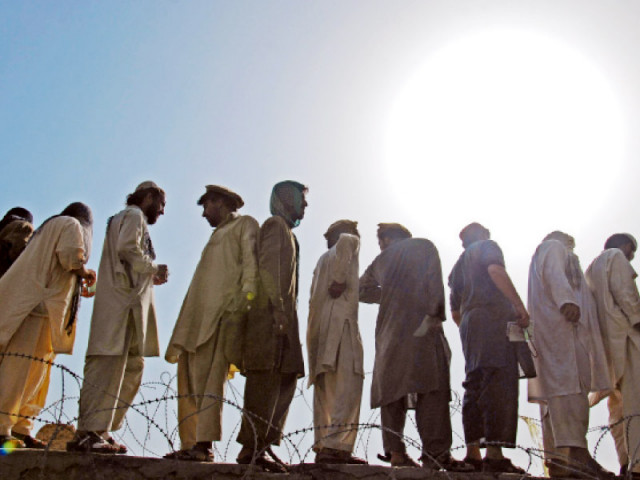No relief in DI Khan: The line never ends for IDPs
Some feel, without an understanding of culture, govt can’t deal with the displaced

No cricket matches are being played at Ratha Kulachi Cricket Stadium in DI Khan but the lines outside stretches as far as the eye can see. With the influx of internally displaced persons (IDP) from Bannu, the stadium ration point has become synonymous with the plight of IDPs.
According to the coordinator of the FATA Disaster Management Authority (FDMA) in DI Khan, Abdul Aziz, 3,500 IDP families from North Waziristan have been registered. The number is likely to increase and may go beyond 7,000 families after the evacuation of IDPs from school-buildings in Bannu, he added.
The plight of the displaced population in DI Khan has been largely overlooked by the government, the story of its disinterest written all over the ration point at the stadium. While part of the problem lies in resource management and provision, the rest lies in a lack of sensitivity while dealing with a different culture.
Cutting the line
Every night, the IDPs start queuing up outside Ratha Kulachi Stadium outside a closed gate where they will receive ration the next morning. They are often stopped from queuing up by the police but put up strong resistance.
During the day, the queue is broken when IDPs start fighting among themselves over someone attempting to cut the line. It comes down to blows and obscenities. Those who are injured are then taken to a hospital. Eventually, the police get involved and close the gate, shutting off access to ration.
But the IDPs continue to queue up.
The necessity of patience
They are not discouraged by long lines; in fact IDPs have found ways to profit from one of the most obvious signs of their loss.
Many offer to exchange their place in line with someone for a spot closer to the end of the queue for Rs500.
“I was thrown out of line when some people started pushing. A scuffle broke out and people beat each other up,” 70-year-old Asif Khan, from Garyum village in North Waziristan, told The Express Tribune.
“I have not received any ration because I came very late over the last couple of days,” said Asif Khan, another displaced person and tribal elder who stood outside the ration distribution point.
“I do not know what to do as I am old and in desperate need of help,” he added.
Short-staffed
The chaos and uncertainty coupled with perceived humiliation at the hands of the police has raised temperatures at the stadium.
Head constable Tariq Khan, who is on duty at the ration centre at the stadium, highlighted some of the problems in dealing with the IDPs.
“I only have seven police personnel who conduct security checks, guard the main gate of the ration centre and control the IDPs,” he said.
“If the government opens other ration distribution centres and coordinates with local tribal leaders to organise the IDPs, the situation would be handled in an effective manner and nothing violent would take place,” said Tariq.
Regardless, their situation is such that IDPs continue to wait outside the ration centre even though they are repeatedly told to come back the next day.
Neglected by the government, the IDPs are frustrated.
“It’s good that women are not allowed to come to the ration points otherwise they would face the same treatment,” said Asif Khan, a displaced person.
Culture shock
Hamza Mehsud, a local journalist in Waziristan, told The Express Tribune, “The government officials and even NGOs workers have a limited understanding of the culture of Waziristan and don’t know how to deal with IDPs.”
He added tribal elders—who are respected back home –have been subjected to ridicule at ration centres. Furthermore, the IDPs need to be treated in accordance with their cultural norms or else they will get frustrated, said Mehsud.
“At present, the IDPs are not happy with the government,” he said.
Given the current mismanagement of the IDP crisis, an obvious solution lies in ration centres on a tehsil-wise basis.
The challenges faced by IDPs have as yet not been tackled efficiently. Most say the issues of double address and family status in CNIC, the education and the repatriation of IDPs linger.
Published in The Express Tribune, September 27th, 2014.













COMMENTS
Comments are moderated and generally will be posted if they are on-topic and not abusive.
For more information, please see our Comments FAQ